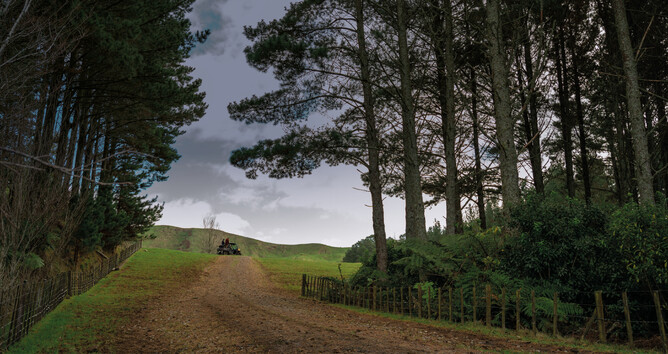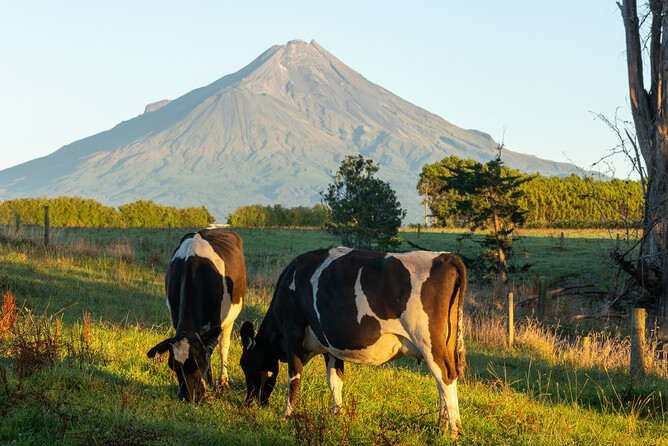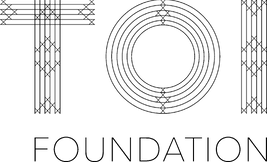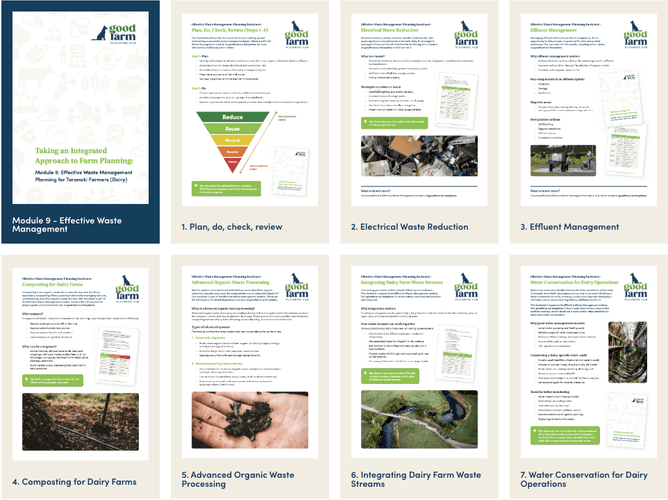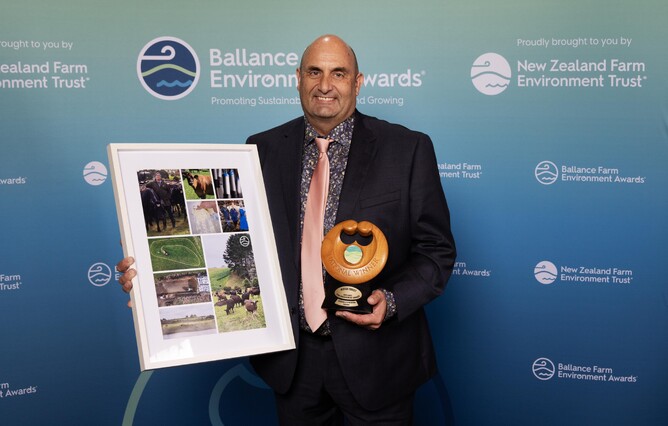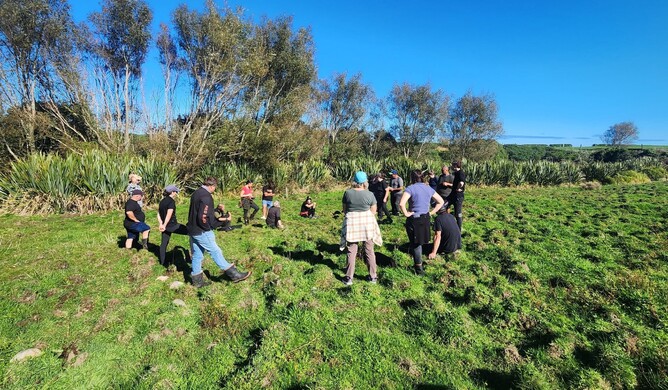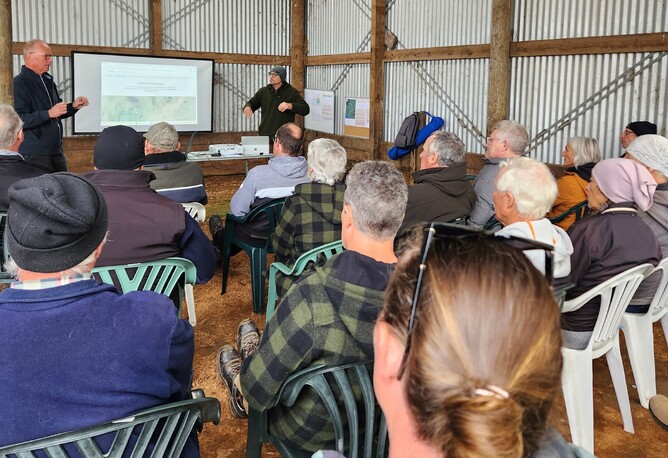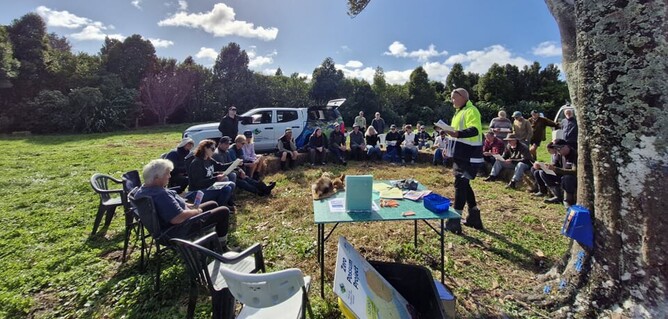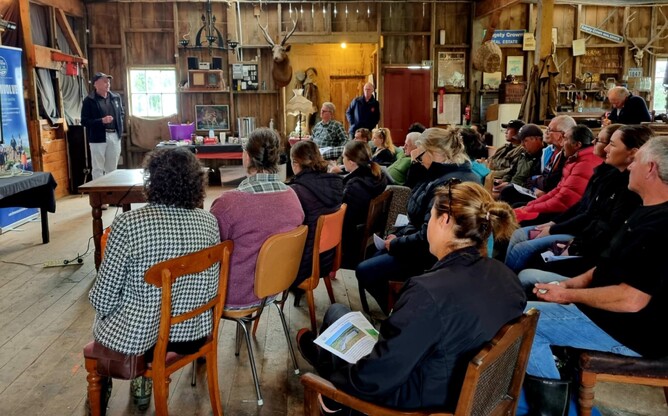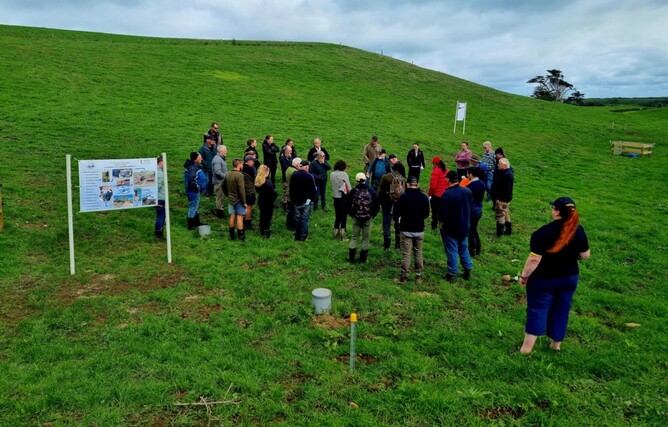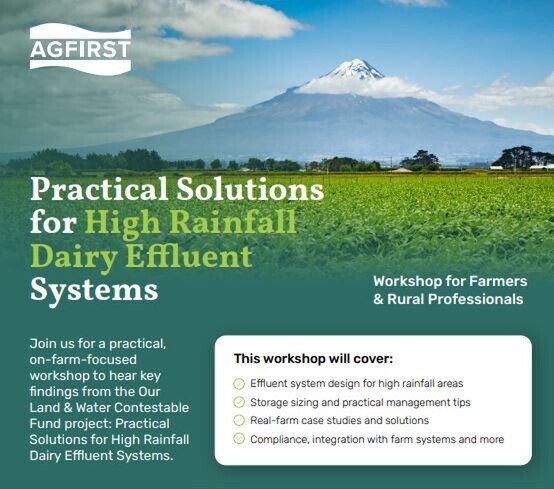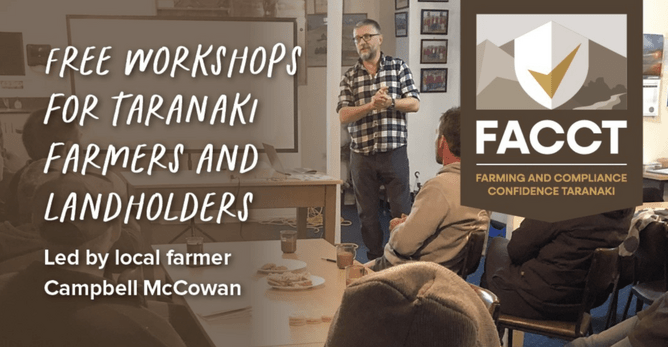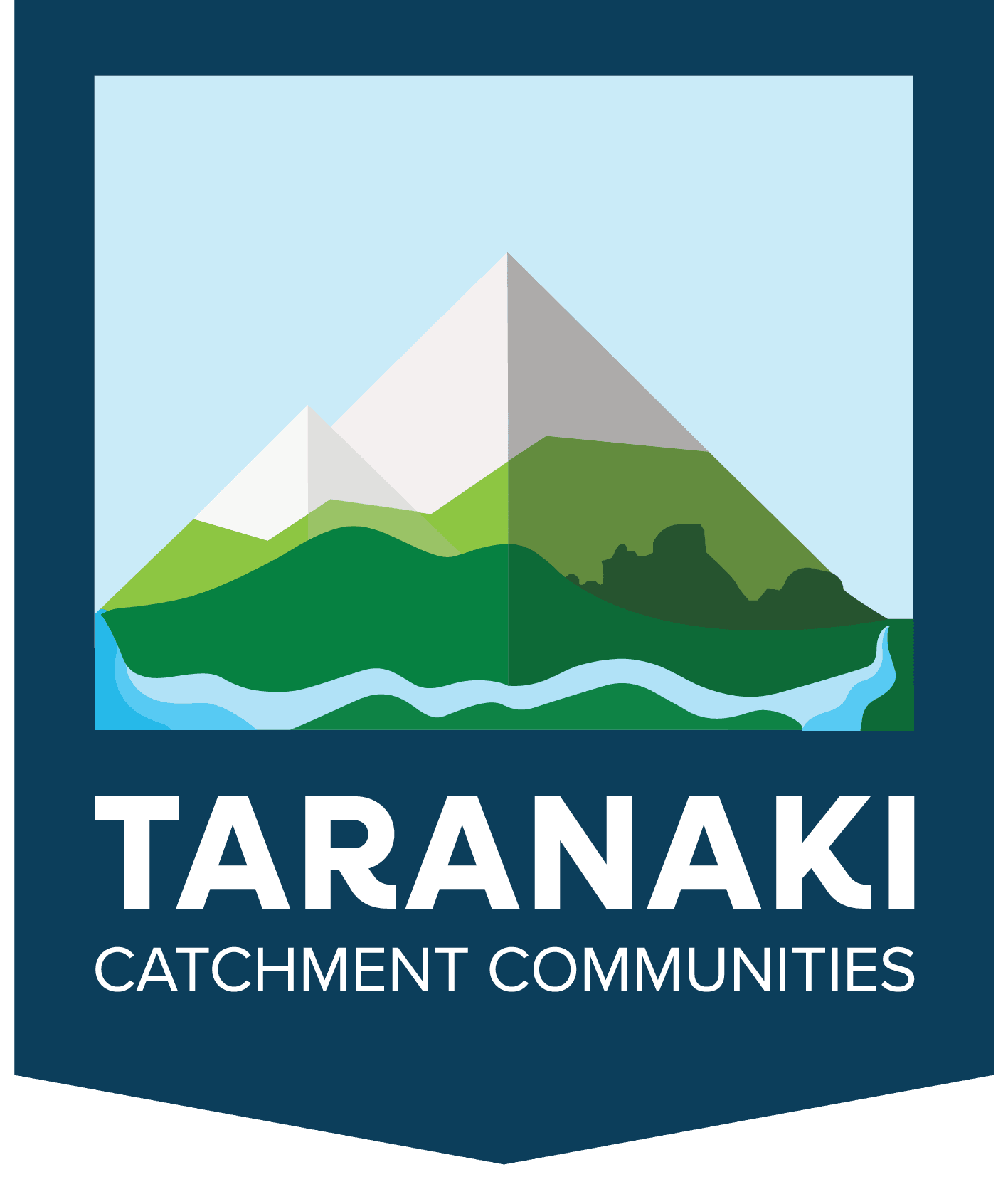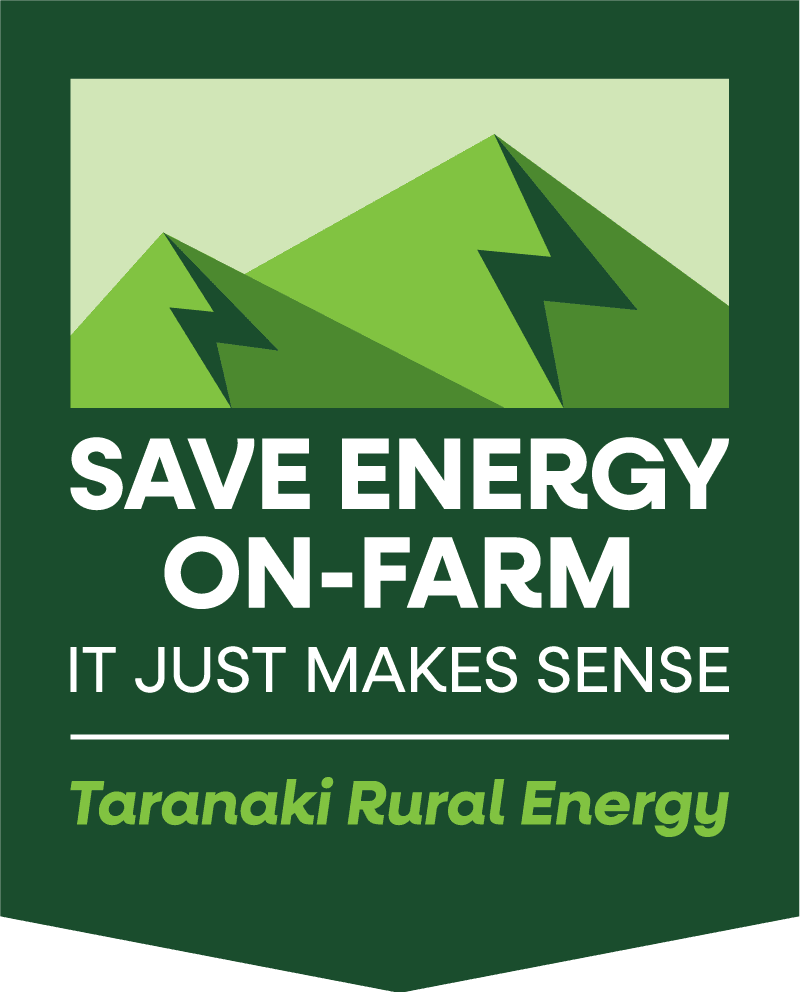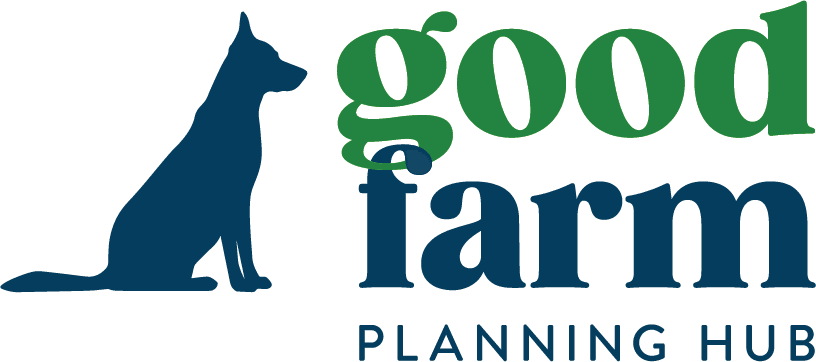Kia ora,
Welcome to the winter edition of our newsletter! It’s been a big couple of years for Taranaki Catchment Communities, and with the completion of our Essential Freshwater Fund project, now’s a great time to reflect on what we’ve achieved together, and where we’re headed next.
This edition shares a snapshot of the incredible work happening across our region: from community-led action and freshwater tech to partnerships, practical on-farm workshops, and progress on future-focused projects like ‘Our Taranaki, Our Future'. You’ll also find highlights from recent field days, training sessions, and upcoming opportunities to get involved.
Thanks for being part of the journey so far. Your support is what keeps our work moving forward.
Happy reading, Paul Turner – TCC Project Manager
Reflecting on Two Years of Progress: Essential Freshwater Fund Project
Over the past two years, TCC has delivered a wide-reaching project through the Essential Freshwater Fund, supporting farmers and catchment groups to improve water quality, build capability, and take local action.
A big part of the project has been helping farmers and growers get to grips with the principles of Te Mana o te Wai, recognising just how important water is, not just for farming, but for the health of people, land and the environment. At its heart, it’s been about finding the right balance between caring for freshwater, looking after the land, and supporting our communities.
The final report highlights the impressive community involvement, the brilliant technical tools developed, and the strong partnerships formed along the way. Here’s a snapshot of what’s been achieved, and where we’re heading next.
Since 2023, we’ve been at the forefront of a community-led approach to improving freshwater outcomes across the region, and we’ve achieved so much: stronger communities, better freshwater awareness, and empowered local solutions driven from the ground up.
✅ 1,575 landowner interactions (target exceeded)
✅ 550+ farmers involved in 16 TRC freshwater consultation drop-ins
✅ 16 active Catchment Groups supported
✅ 68 events delivered (46 community + 22 training)
✅ 7 staff members employed to support our work
Behind the scenes, a major focus has been on developing smart tools and technical approaches to meet freshwater goals. Some highlights include:
✅ 3,300+ LiDAR farm maps produced (well over target)
✅ 47 monthly monitoring sites setup and running
✅ 40+ Freshwater FarmPlans completed
✅ Successful tech uptake in other regions
✅ A 110,000-hectare mapping project in the Waitōtara catchment
Innovative demonstrations like bioreactors, fish passage systems, and the ‘Drains are Streams’ project offered practical, on-farm solutions with strong uptake. What’s awesome is that all our technical work is already being replicated elsewhere in New Zealand, with TCC’s LiDAR work now influencing planning in other regions.
At the heart of this project is partnership with farmers, iwi, researchers, industry, and government.
Thanks to this work, TCC now has an iwi engagement strategy, lasting relationships with three universities and industry partners, including Venture Taranaki, Dairy NZ, Federated Farmers and NZ Beef + Lamb, leveraging their expertise, resources and communication channels and a sustainable funding model, already securing $640,000 from the Toi Foundation for follow-on work in 2025–2026.
Communications and outreach were also a key part of the project’s success, helping raise awareness, share stories, and keep communities informed. With a total social media reach of over 71,000 and a click-through rate of 2.58% (well above average), the project also gained positive coverage across both rural and mainstream media.
What’s Next for TCC
With the Essential Freshwater Fund project now wrapped up, we are focused on turning momentum into long-term impact.
In the next few months, TCC will transition the work that started as part of the Essential Freshwater Funded programme and integrate it into the Our Taranaki, Our Future project. Our thanks to MfE for an additional $100,000 for the next 12 months to support us in this work.
Our vision is to grow into a permanent regional organisation supporting local leadership in freshwater and environmental work. Over the next five years, key priorities include supporting other regions to adopt the TCC model, developing training for catchment coordinators nationwide, launching an online portal for LiDAR mapping and community monitoring tools, expanding formal partnerships with all Taranaki iwi, and building lasting collaborations with research and industry partners.
With $640,000 secured from the Toi Foundation, TCC’s next project, ‘Our Taranaki, Our Future’, will continue our important work by extending LiDAR mapping across more catchments, developing ‘Flow Mapping’ with Massey University, continuing fish passage work through Wai Connect (with NIWA), providing more HADES workshops on effluent and E. coli risk, growing community water monitoring across more sites and expanding wetland restoration, building on the Makuri model. We’re excited to work alongside more communities to protect and improve freshwater across Taranaki.
Good Farm: Practical Tools to Tackle Waste
Taranaki farmers are embracing smarter, more sustainable practices with support from the Good Farm Planning Hub – and waste management is front and centre.
The brand-new Effective Waste Management module is a handy, practical resource that helps farmers manage effluent, e-waste, composting, chemical disposal, and water use, all while building a plan that’s fit-for-purpose and meets environmental standards.
To make it even easier, the Good Farm team has created seven factsheets breaking down key waste management topics into simple, action-focused steps. Whether you're looking to start composting, safely manage electrical waste, or improve water conservation, these resources offer clear, practical guidance tailored for Taranaki farms. Visit goodfarm.nz/resources/waste-management to find out more.
But it’s not just about waste management. The Good Farm Planning Hub provides a wide range of free templates, tools, and real-world examples at goodfarm.nz, as well as one-on-one support and workshops across the region. Be sure to check out the full range of modules and downloadable tools at goodfarm.nz/resources, or talk to your catchment coordinator if you’d like help getting started.
Our next Good Farm module is on Biodiversity, which is jampacked with great insights and details on how to approach biodiversity planning on your farm.
And if you’re on Facebook, come join us there too. We’ve just ticked over 200 followers, which is awesome! Follow @goodfarmnz to stay in the loop with new resources, success stories and local events.
Congratulations Brendan Attrill
Taranaki Catchment Communities is proud to celebrate Brendan Attrill of Caiseal Trust, who has been awarded the prestigious 2025 Gordon Stephenson Trophy and named the National Ambassador for Sustainable Farming and Growing.
Brendan farms at Huinga, where he’s a third-generation dairy farmer milking 350 cows across 163 hectares. His holistic approach to farming blends profitability with environmental responsibility, leading with long-term thinking, innovation, and a deep respect for the land.
His win is a huge achievement not just for Brendan and his whānau, but for the wider Taranaki farming community. It’s fantastic to see local leadership and sustainable practices recognised on the national stage. Brendan was also named the Supreme Winner of the Taranaki Ballance Farm Environment Awards back in April.
Wetlands and Waterways in the Spotlight
Early May was a big one for catchment action in Taranaki, with two fantastic events bringing people together to share knowledge, celebrate progress, and learn from one another.
Healthy Rivers, Thriving Land – Waingongoro Catchment
Hosted by Dean and Kim on their farm, this event highlighted their ongoing riparian planting work and the positive impact it’s having on water quality. Attendees also heard about the results from two years of water sampling along the Waingongoro River and its tributaries. A great turnout and plenty of practical conversations made for a valuable day out.
Restoring Wetlands – Pihama/Oeo Catchment
Matt and Megan Symons welcomed the community to their farm for a wetland-focused field day. Wetland ecologist David Munro and Alice West from Taranaki Regional Council led a hands-on farm walk, sharing insights into how to identify wetlands, what regulations apply, and how to support these ecosystems to thrive.
A big thank you to all the farmers, speakers, and attendees who made these events possible. Your involvement makes all the difference and keeps us moving forward. More events are coming!
Trapping Workshop with the HADES Catchment Group
Ōkato was buzzing in early May, as the HADES Catchment Group teamed up with Towards Predator-Free Taranaki for a hands-on trapping workshop.
The event brought together an enthusiastic group of locals keen to learn how to make a difference in their backyard. Expert speakers Cody from the Zero Possum team, Lance from the Rotokare Scenic Reserve Trust, and contractor Adrian Mills shared practical knowledge, smart trapping techniques, and their passion for protecting native wildlife.
Special thanks to Towards Predator-Free Taranaki and the Ōkato Lions for supporting the day, and for putting on a top-notch sausage sizzle.
Awesome to see such strong community support for pest control and biodiversity.
Working Together for Cleaner Water in Waingongoro
Mid-May saw another great collaboration between science and community at the Massey University – Catchment Solutions workshop with the Waingongoro Catchment Group.
Held in Ōhawe, the event focused on practical, cost-effective ways to reduce contaminant loss from farms and improve water quality across the catchment. A standout topic was woodchip bioreactors, which are simple structures that filter drainage water before it reaches waterways. These systems are low-maintenance, long-lasting (up to 15 years), and an accessible solution for many farms.
As part of the Catchment Solutions Project (CSP), Massey University’s School of Agriculture and Environment has been monitoring water quality in the area and working closely with local farmers. Their partnership with the Waingongoro Catchment Group recently led to the installation of a woodchip bioreactor on Ross and Jan Dunlop’s farm; a big step towards cleaner water.
A huge thank you to all who attended and contributed. It's this kind of hands-on collaboration that drives lasting change. Keep an eye out for future workshops!
Practical Effluent Management for High Rainfall Areas
On 18 June, dairy farmers gathered in Ōpunake and Stratford for a practical workshop hosted by AgFirst NZ, focusing on managing dairy effluent in high rainfall regions - an issue especially relevant in Taranaki.
The sessions drew on insights from TCC, DairyNZ, HADES group, and farmers, and covered key topics such as:
Effluent system design tailored for wetter climates
Storage sizing and management tips to avoid overflows
Compliance advice and how to integrate systems effectively
Real-farm case studies showing what works on the ground
Attendees appreciated the clear, actionable guidance and local examples. Thanks to everyone who came along! Practical events like these make a real difference in how we farm sustainably.
First Aid for Farmers – Red Cross Certification Courses
TCC recently ran a series of subsidised Red Cross First Aid courses tailored specifically for farmers and rural life, with sessions held in Matapu, Ratapiko and Awatuna/Auroa throughout July.
The courses were well attended, giving local farmers the chance to refresh their first aid skills, build confidence, and gain practical emergency response training.
If you missed out and would be interested in attending a future course, please get in touch with the TCC team by sending an email to taranakicc@gmail.com to register your interest.
First Aid Training a Success in Ratapiko
Over the course of a week, the Ratapiko Catchment Group hosted two successful Red Cross first aid courses. These sessions weren’t just about gaining life-saving knowledge; they offered so much more.
And despite the cold weather, the courses became a great opportunity to step away from the day-to-day, connect with others, and enjoy being together in the rural hall for a different purpose.
Ten farmers, from lifestyle block owners to those running large-scale farms, were revalidated on the first course. The second brought together a mix of participants from two schools and three agricultural businesses, all completing their first aid certificates for the first time.
Participants were especially thankful to TCC for subsidising the course costs, and to the Red Cross team for delivering such a practical and engaging training experience.
Congratulations to everyone who took part. Wishing the Ratapiko Catchment Group all the best for the busy season ahead!
There’s plenty happening across our catchments this month and beyond. Here are two great opportunities to get involved. Check full details at taranakicc.nz/events.
FACCT 2 Workshops – From Maps to On-Farm Action
Following the success of FACCT 1, we’re excited to roll out FACCT 2, a follow-on series designed for those who attended the first round.
These sessions will dive deeper into:
Interpreting your land’s features using mapping tools
Supporting smarter, more informed farm planning
Improving environmental outcomes and confidence with compliance
Led by local farmer Campbell McCowan, FACCT 2 is a closed workshop series, focused on turning insights into action. Lunch is provided.
These workshops are a great way to build skills, confidence, and community connection, so don’t miss out. For more info on dates, visit taranakicc.nz/events.

